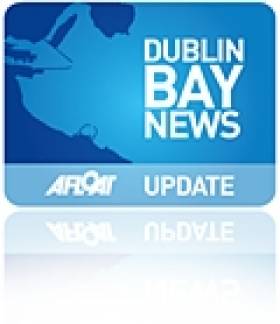Displaying items by tag: HMS Bangor
Minehunter that Served in Libya Anchors in Dublin Bay
#NAVAL ANCHORAGE – A Royal Navy mine-hunter HMS Bangor (MI09) which took part in Libyan operations last year, anchored overnight in Dublin Bay during the north-easterly gale force winds, writes Jehan Ashmore.
Unlike the majority of vessels which anchor in the south of the bay, she unusually took anchorage north of the main shipping lane for Dublin Port by positioning off Sutton South on Howth Peninsula.
HMS Bangor is a Sandown class mine-hunter and she is due to continue her northbound passage through the Irish Sea to spend Easter at her affiliated namesake town on the shores of Belfast Lough.
Her last call to Bangor was to celebrate Armed Forces Day 2010 and also in that year she called to Dublin, click HERE for that report.
On this occasion she will tell of her role supporting NATO operations off the coast of Libya. During Operation Unified Protector, the mine-hunter's task involved 120 days of non-stop action by scouring miles of sea bed off Libya as the battle between rebels and Colonel Gaddafi raged.
Built in 1999 by Vosper Thorneycroft, Southampton, the glass-reinforced plastic (GRP) ship and her 34 crew undertook the painstaking work. This paid off when the 55m vessel found a 2,400-pound (1000kg) mine and a torpedo lying on the seabed off the port of Tobruk in eastern Libya.
Both were safely destroyed using the ship's Sea Fox system – an underwater drone armed with explosive charges.
HMS Bangor is among seven of her class based at on the Clyde, Scotland. They each displace 600 tonnes and have a range of 2,500 nautical miles. For further details about the class, click HERE.
Royal Navy Mine-Hunter to Visit Dublin
A courtesy visit by the Royal Navy's HMS Bangor (M106) is due in Dublin tomorrow. The mine counter-measure vessel is base-ported at HM Naval Base, Clyde, Scotland and is named after Bangor, the shoreside town on Belfast Lough.
For over 15 years, the 484-tonnes vessel has had a close affiliation with the Combined Cadet Force and Bangor Grammar School. In late June HMS Bangor returned to her namesake port to support Armed Forces Day celebrations which included the 150th anniversary of the Sea Cadets and to participate in the annual Sea Bangor Maritime Festival.
HMS Bangor is the ninth 'Sandown' class of Single Role Minehunters (SRMH) built by Vosper Thorneycroft, Woolston near Southampton. The glass-reinforced plastic (GRP) ship was launched in April 1999. The vessel has a crew of 34 and is fitted with an array of mine countermeasure equipment that includes decoy launchers and disposal systems.
In 2002 the vessel was deployed to the Gulf in Operation Telic, conducting mine clearance operations in Khawr Abd Allah ahead of humanitarian aid shipments which were ferried into the Iraqi port of Umm Qasr.

























































